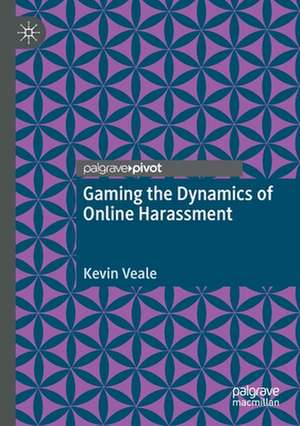Gaming the Dynamics of Online Harassment
Autor Kevin Vealeen Limba Engleză Paperback – 13 noi 2021
The comparison also underlines the complicity of social networks in online harassment, since the communities use their designs as tools. Social networks know this, and need to work on minimizing the problem, or acknowledge that they are profiting through promoting abuse.
| Toate formatele și edițiile | Preț | Express |
|---|---|---|
| Paperback (1) | 380.63 lei 6-8 săpt. | |
| Springer International Publishing – 13 noi 2021 | 380.63 lei 6-8 săpt. | |
| Hardback (1) | 386.99 lei 6-8 săpt. | |
| Springer International Publishing – 13 noi 2020 | 386.99 lei 6-8 săpt. |
Preț: 380.63 lei
Nou
Puncte Express: 571
Preț estimativ în valută:
72.84€ • 77.88$ • 60.73£
72.84€ • 77.88$ • 60.73£
Carte tipărită la comandă
Livrare economică 17 aprilie-01 mai
Preluare comenzi: 021 569.72.76
Specificații
ISBN-13: 9783030604127
ISBN-10: 3030604128
Pagini: 168
Ilustrații: X, 168 p.
Dimensiuni: 148 x 210 mm
Greutate: 0.24 kg
Ediția:1st ed. 2020
Editura: Springer International Publishing
Colecția Palgrave Macmillan
Locul publicării:Cham, Switzerland
ISBN-10: 3030604128
Pagini: 168
Ilustrații: X, 168 p.
Dimensiuni: 148 x 210 mm
Greutate: 0.24 kg
Ediția:1st ed. 2020
Editura: Springer International Publishing
Colecția Palgrave Macmillan
Locul publicării:Cham, Switzerland
Cuprins
1. Introduction: The Breadth of Harassment Culture, and Contextualising Gamergate.- 2. Networked Publics of Abuse.- 3. Exploring the Overlap Between Hatemobs and ARGs.- 4. Gaming the Rules.- 5. Problematic Tools and Platform Complicity.- 6. Reshaping the Landscape.- 7. Conclusion: The Christchurch Call to Action Summit, And What Follows.
Notă biografică
Kevin Veale is a Lecturer in Media Studies for the College of Humanities and Social Sciences at Massey University in Aotearoa-New Zealand. His work focuses on storytelling across media forms, and exploring the ways that different forms of mediation shape the affective experiences of the stories they mediate.
Textul de pe ultima copertă
“In this provocative new book, Dr. Kevin Veale uncovers the links between communities of online hate and communities of online problem-solving. Using Alternate Reality Games as a key metaphor, Veale not only illustrates how hate communities develop, but also how they can be effectively fought.”
- Paul Booth, DePaul University, USA, author of Digital Fandom and Board Games as Media
“A well-cited and considered account that internet malcontents could only dream of having their own version of. Great background reading for anyone interested in activism in online space, and the death of the disingenuous online troll.”
- - Leena van Deventer, RMIT University, Australia; Creative Producer, Dead Static Drive; co-author of Game Changers: From Minecraft to Misogyny, the Fight for the Future of Videogames
“The monetisation of hate and theweaponisation of the internet are key challenges facing humanity in the digital age. This important book traces the evolution of online harassment and ‘hatemobs’ while revealing a startling truth: the very design of our networks fosters hate. And we can change it.”
- David Shanks, Chief Censor, Office of Film & Literature Classification, Aotearoa-New Zealand
This book argues that online harassment communities function as Alternate Reality Games (ARGs) where the collective goal is to ruin peoples’ lives. Framing these communities like ARGs highlights ways to limit their impact in the future, partly through offering people better ways to control their own safety online.
The comparison also underlines the complicity of social networks in online harassment, since online harassment communities use their designs as tools. Social networks know this, and need to work on minimizing the problem, or acknowledge that they are profiting through promoting abuse.
Kevin Veale is a Lecturer in Media Studies for the College of Humanities and Social Sciences at Massey University in Aotearoa-New Zealand. His work focuses on storytelling across media forms, and exploring the ways that different forms of mediation shape the affective experiences of the stories they mediate.
“A well-cited and considered account that internet malcontents could only dream of having their own version of. Great background reading for anyone interested in activism in online space, and the death of the disingenuous online troll.”
- - Leena van Deventer, RMIT University, Australia; Creative Producer, Dead Static Drive; co-author of Game Changers: From Minecraft to Misogyny, the Fight for the Future of Videogames
“The monetisation of hate and theweaponisation of the internet are key challenges facing humanity in the digital age. This important book traces the evolution of online harassment and ‘hatemobs’ while revealing a startling truth: the very design of our networks fosters hate. And we can change it.”
- David Shanks, Chief Censor, Office of Film & Literature Classification, Aotearoa-New Zealand
This book argues that online harassment communities function as Alternate Reality Games (ARGs) where the collective goal is to ruin peoples’ lives. Framing these communities like ARGs highlights ways to limit their impact in the future, partly through offering people better ways to control their own safety online.
The comparison also underlines the complicity of social networks in online harassment, since online harassment communities use their designs as tools. Social networks know this, and need to work on minimizing the problem, or acknowledge that they are profiting through promoting abuse.
Kevin Veale is a Lecturer in Media Studies for the College of Humanities and Social Sciences at Massey University in Aotearoa-New Zealand. His work focuses on storytelling across media forms, and exploring the ways that different forms of mediation shape the affective experiences of the stories they mediate.
Caracteristici
Argues that online communities focused on harassment and abuse function as Alternate Reality Games (ARGs) where the collective goal is to ruin the lives of those they target Seeks to engage with topical issues regarding how digital and cultural infrastructures shape political movements across the globe Illustrates that tools for mitigating and preventing online harassment are possible and affordable
